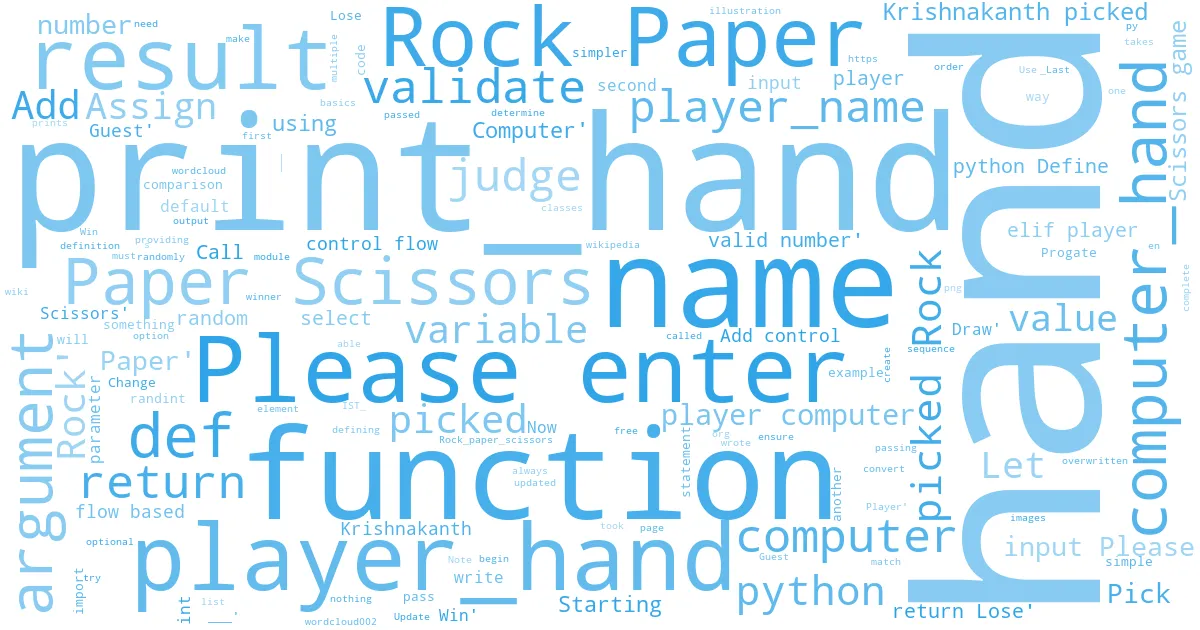Python Functions - Rock Paper Scissors game

This is an illustration of basics of Python functions. In this example, we will write a simple Rock-Paper-Scissors using Python functions.
Here is an example of defining a simple function that prints something and how to call the function.
# Define print_hand function
def print_hand():
print('You picked: Rock')
# Call print_hand function
print_hand()
The function above takes no arguments. Let's pass an argument called hand and print it.
# Add a parameter to print_hand
def print_hand(hand):
# Use the parameter to print 'You picked: ___'
print('You picked: '+hand)
# Call print_hand with 'Rock'
print_hand('Rock')
# Call print_hand with 'Paper'
print_hand('Paper')
Now let's pass multiple arguments. While passing more than one argument, the sequence or order of arguments must match with the function definition.
# Add a parameter to print_hand
def print_hand(hand,name):
# Change the output to '___ picked: ___'
print(name+' picked: ' + hand)
# Add a second argument to print_hand
print_hand('Rock','Player')
# Add a second argument to print_hand
print_hand('Paper','Computer')
We can also make some arguments optional be providing them with default values.
# Add a default value for name
def print_hand(hand, name='Guest'):
print(name + ' picked: ' + hand)
# Add an argument to print_hand
print_hand('Rock')
Default argument values will be overwritten when their values are passed to the function. Let's input player's name.
# Get input, and then assign it to the player_name variable
player_name=input('Please enter your name: ')
# Add a second argument to print_hand
print_hand('Rock',player_name)
Let's add an option to select hand.
def print_hand(hand, name='Guest'):
# Assign a list of hands to the hands variable
hands=['Rock','Paper','Scissors']
# Update using an element of the hands variable
print(name + ' picked: ' + hands[hand])
print('Starting the Rock Paper Scissors game!')
player_name = input('Please enter your name: ')
# Print 'Pick a hand: (0: Rock, 1: Paper, 2: Scissors)'
print('Pick a hand: (0: Rock, 1: Paper, 2: Scissors)')
# Get input, convert it, and assign it to the player_hand variable
player_hand=int(input('Please enter a number (0-2): '))
# Change the first argument to player_hand
print_hand(player_hand, player_name)
We need to ensure that the player only selects 0, 1 or 2 and nothing else. Let's add another function to validate player input using an if...else statement.
# Define the validate function
def validate(hand):
# Add control flow based on the value hand
if hand<0 or hand>2:
return False
else:
return True
def print_hand(hand, name='Guest'):
hands = ['Rock', 'Paper', 'Scissors']
print(name + ' picked: ' + hands[hand])
print('Starting the Rock Paper Scissors game!')
player_name = input('Please enter your name: ')
print('Pick a hand: (0: Rock, 1: Paper, 2: Scissors)')
player_hand = int(input('Please enter a number (0-2): '))
# Add control flow based on the return value of the validate function
if validate(player_hand):
print_hand(player_hand, player_name)
else:
print('Please enter a valid number')
Is there a simpler way to write the validate function? Let's try.
# Define the validate function
def validate(hand):
return 0<=hand<=2
Now that the player is able to select a hand, let's assign a hand to the computer too. Let's begin with the computer always selects 'Paper'.
if validate(player_hand):
# Assign 1 to the computer_hand variable
computer_hand=1
print_hand(player_hand, player_name)
# Call print_hand function with computer_hand and 'Computer' as arguments
print_hand(computer_hand,'Computer')
else:
print('Please enter a valid number')
Now we'll create another function Judge to determine the winner using if-else statements.
# Define the judge function
def judge(player,computer):
# Add control flow based on the comparison of player and computer
if player==computer:
return 'Draw'
elif player==0 and computer==1:
return 'Lose'
elif player==1 and computer==2:
return 'Lose'
elif player==2 and computer==0:
return 'Lose'
else:
return 'Win'
if validate(player_hand):
computer_hand = 1
print_hand(player_hand, player_name)
print_hand(computer_hand, 'Computer')
# Assign the return value of judge to the result variable
result=judge(player_hand,computer_hand)
# Print the result variable
print('Result: '+result)
else:
print('Please enter a valid number')
Is there a simpler way to write the Judge function here?
# Define the judge function
def judge(player,computer):
# Add control flow based on the comparison of player and computer
if player-computer in [1,-2]:
return 'Win'
elif player==computer:
return 'Draw'
return 'Lose'
if validate(player_hand):
computer_hand = 1
print_hand(player_hand, player_name)
print_hand(computer_hand, 'Computer')
# Assign the return value of judge to the result variable
result=judge(player_hand,computer_hand)
# Print the result variable
print('Result: '+result)
else:
print('Please enter a valid number')
We would like the computer to select a hand randomly using the random function. Here is the complete code for the rock-paper-scissors game.
def print_hand(hand, name='Guest'):
hands = ['Rock', 'Paper', 'Scissors']
print(name + ' picked: ' + hands[hand])
def validate(hand):
return 0<=hand<=2
def judge(player,computer):
if player-computer in [1,-2]:
return 'Win'
elif player==computer:
return 'Draw'
return 'Lose'
# import the random module
import random
print('Starting the Rock Paper Scissors game!')
player_name = input('Please enter your name: ')
print('Pick a hand: (0: Rock, 1: Paper, 2: Scissors)')
player_hand = int(input('Please enter a number (0-2): '))
if validate(player_hand):
# Assign a random number between 0 and 2 to computer_hand using randint
computer_hand = random.randint(0,2)
print_hand(player_hand, player_name)
print_hand(computer_hand, 'Computer')
result = judge(player_hand, computer_hand)
print('Result: ' + result)
else:
print('Please enter a valid number')
Note: The code on this page is something that I wrote when I took Progate's free Python classes.
Last updated 2020-12-01 15:56:41.395022 IST
Comments